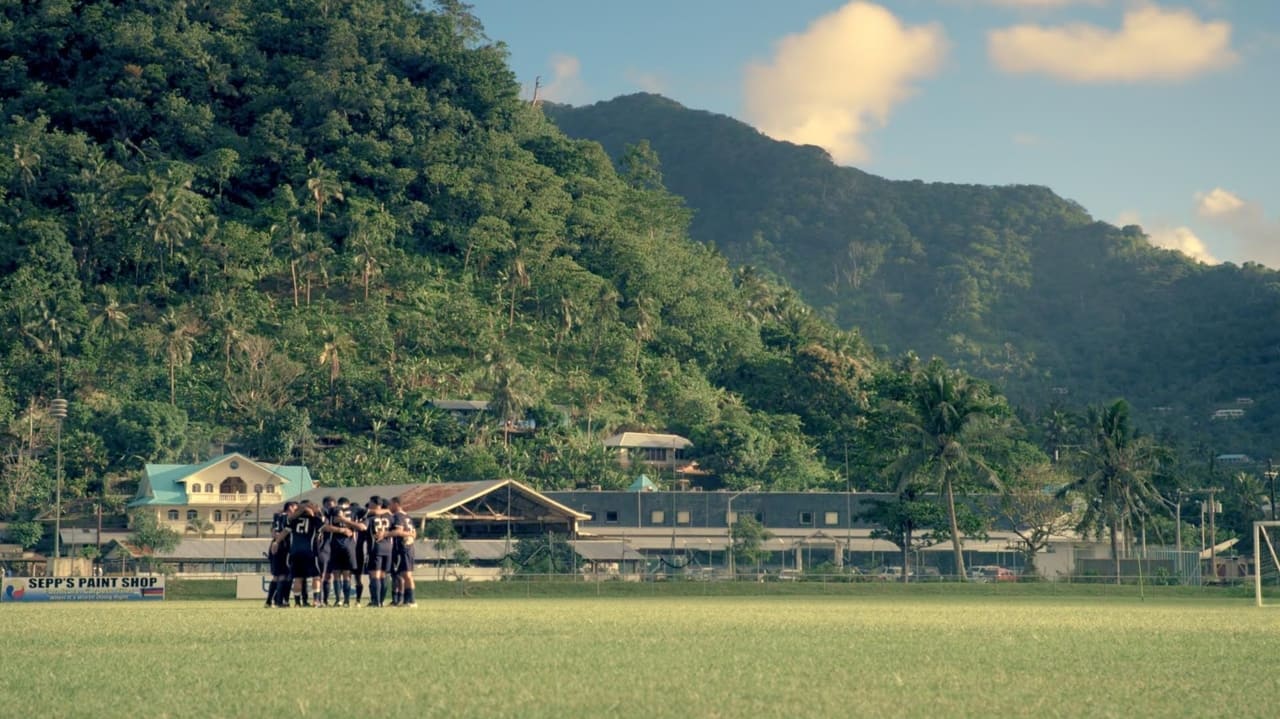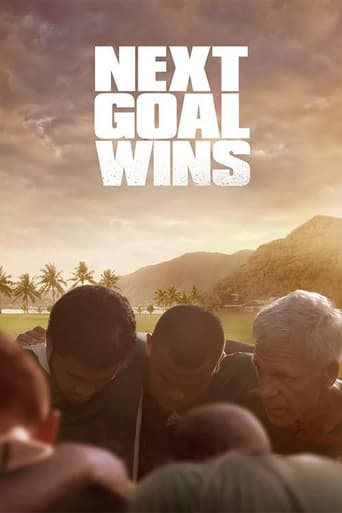CrawlerChunky
In truth, there is barely enough story here to make a film.
Neive Bellamy
Excellent and certainly provocative... If nothing else, the film is a real conversation starter.
Roy Hart
If you're interested in the topic at hand, you should just watch it and judge yourself because the reviews have gone very biased by people that didn't even watch it and just hate (or love) the creator. I liked it, it was well written, narrated, and directed and it was about a topic that interests me.
Abegail Noëlle
While it is a pity that the story wasn't told with more visual finesse, this is trivial compared to our real-world problems. It takes a good movie to put that into perspective.
MattyGibbs
Next Goal Wins follows the American Samoa football team through their world cup qualifying games. They are famous for their record 31-0 defeat to Australia and being the worst team in the world. You really don't have to like football at all to enjoy this excellent documentary. It has a host of natural but great personalities and it is refreshing to see people playing sport for the right reasons. It was nice to see the culture of the American Samoans which seems a lot more welcoming than many western cultures. The fact that no-one seemed to playing up to the camera at all is a credit to all participants.I really enjoyed this uplifting and at times tear jerking documentary and highly recommend it to non football and football fans alike.
Prismark10
In 2001 American Samoa lost 31–0 to Australia. It was the worst defeat in international football. Things have not been much better for the American Samoa team since then. To qualify for the 2014 FIFA World Cup potential salvation comes in the unlikely form of Thomas Rongen, an American based Dutch soccer coach.He commits for one month to give the team a fighting chance. During this brief period he focus on achievable tactics, fitness, a better defence as well as organising training sessions around the part time footballers. He also finds a couple of non island recruits who are of American Samoan heritage. Their form has been so bad that scoring a goal would be a bit of an achievement. It turns out that Rongen also has a personal tragedy to overcome.The film also focuses on Jaiyah (Johnny) Saelua, a member of the team since 2003 but is the first trans-gender player to compete in a men's FIFA World Cup qualifier and is wholly accepted by the team. Samoan culture has a different attitude to trans-gender than in the west. We also see the unfortunate goalkeeper who let in all the goals against Australia.Its a classic underdog and uplifting story but done in a minor key. Its nice to see football at the other end of the spectrum without overpaid prima donnas but for me the documentary was too formulaic and manipulative.
bob the moo
Next Goal Wins is a documentary about football/soccer, which came out in the year of the Brazilian World Cup, where the greatest footballing nations in the world come together for the biggest festival of the sport in the world; at the other end of that spectrum we have American Samoa – the team famous for the 31-0 defeat they suffered at the hands of Australia in 2001. This is the story of a tiny country with a national team of amateurs who work full- time jobs around their practice sessions as they prepare for the World Cup qualifiers against a backdrop of never having won a competitive match in their history, and only having scored twice in the last 17 years.Like almost everyone else that talks about this film, I will struggle to write more than a sentence before I contrast this film with the FIFA World Cup because, although they are the same sport, they are at polar extremes to one another in terms of content. I'll also do what a lot of people have done, and reference the wonderful John Oliver bit on HBO where he tore FIFA's approach apart at a time where the corruption and lack of ability to do anything about it was also hurting how people felt about the body. Of course the World Cup was still a great success because people love the sport even if they universally hate the organizing body. This film strikes wonderfully at the nerve because it is about love of the sport, about trying despite the odds and, on a bigger scale, about people and a community.The film does have a weakness in that it knows all this and as a result it perhaps plays towards it a bit too obviously at times; structuring itself in an effective manner sure, but I could have done with a few fewer moments of music coming in and people talking about courage and such. That said, it is hard not to do this because all the things are in place here – we have great characters, a unique setting and a wonderful sense of enjoyment (which the film brings out in this way). It helps to not know anything about the end point of the film (I didn't) but in the end it doesn't really matter because it is the ride and effort that is the fun part and even if you do not care about the sport, the film wisely picks its characters so that you care about specific people and thus the whole.It is hard not to feel nervous as the team head towards another game – sometimes with the goal of just not losing too badly – and this increases as the new coach tries to pull them together. It is also hard not to be moved by the presence of transgender Jaiyah and the history made there – again, with all the headlines at the time reminding us that one of the next tournaments will be in Qatar, where Jaiyah would not find the welcome that she finds in her community, team and sport. It is hard not to be really moved at times because the film, although a bit too heavy at times, is generally very good at building all this together and putting it on the field.It is a small story and it falls so totally outside of Brazil 2014 that it can more than serve as a refreshing documentary that has a great underdog story (there is no lower) and delivers it with strong characters and a sense of joy.
joeapplebey
When deciding on what to see last night, I sarcastically suggested 'Next Goal Wins' to my friend. The joke was that football movies are generally underwhelming (besides, she not into football); the first problem being that it's hard to capture the intensity and excitement of 90 minute games in five minute scenes, the second being that if anything too amazing happens it's not believable. If Manchester City's last minute Premiere League win in 2012 was fictional, nobody would buy it. I knew nothing about the film, and after seeing that it was a highly rated documentary (currently 8.7 on IMDb) it sounded like a rare treat; a good football movie. So Ten years after an embarrassing 31-0 loss to Australia, the American Samoan football team begin their world cup qualifying campaign with help from a new coach, the US based Dutchman Thomas Rongen. Rongen's the main focus of the film, a high level manager taking on the challenge of coaching 'The World's worst team', an eccentric Dutch rock star, berating and bonding with the team in equal measure. In his first ten minutes on screen he shouts down FIFA officials, insists on climbing to the highest point of the island for his country, and shows his sense of humour by responding to the team's intimidating Haka with 'Well done, well done, well done. I just sh*t myself in my pants, seriously'. Also featuring heavily is goalkeeper Nicki Palapu, who carries the scars of humiliation from the record-breaking Australian defeat, and Jiyah Saelau, the world's first World Cup qualification transgender player, as well as two American ringers (distant American Samoan relatives allowing them in the team) brought in by Rongen.The film shows interviews with the players and their families, coaching sessions and of course football matches, but much of the joy comes from watching the players bond, and as Rongen is introduced to the rich, loving culture of American Samoa, so are we. It feels like the 'bonding sessions' - players swimming, hiking and going to church together - is a way of life for American Samoans, and there are some lovely moments of sheer unadulterated friendship. Jaiyah Saelua is one of the more interesting players, a Fa'afafine, (the third sex of Samoa, born male but with both male and female traits, an important part of Samoan culture, dedicated to family). Her gender is accepted by the players, and in a sport rife with prejudice - homophobia and racism are big issues in modern football - it's lovely to see the players sing, dance and eat with their sister at night, after training hard with her in the day. Besides, she's an extremely likable screen presence. The American Samoan culture is the most escapist element of the film, and the idea of one big island family is very appealing. The Island is gorgeous, and the cinematography captures it beautifully. The film often looks like an advert for a digital camera, the team playing keepie uppie before the setting sun, or back-flipping out of the ocean (water is everywhere; it rains for at least half the movie), always in slow motion. These moments of spectacle are some of the most enjoyable in the film, and the combination of sublime moments of beauty and the tension of watching a team you have come to know and love make for excellent pacing. Indeed one of the only criticisms is that you are left wanting more after some of the fastest 97 minutes of your cinema life, and you'll likely miss the players when the film ends.The games themselves are exciting; the editing is cinematic, and although the football isn't high quality, you're so invested in the players that it's as tense, joyous and desperate as watching your own team, and I had to refrain from cheering a few times in a fairly empty screening. It's like watching your kid's team play, only with tasteful, suspenseful slow motion. The theme of family and togetherness is the most prominent. The team has stuck together, facing constant defeat without a goal in the last seventeen years, and the sacrifices they make for each other, putting in hours of training before and after every full day of work is astounding. Filmmakers have tried to tell their story before, but fear of ridicule has denied them access to the team. Directors Mike Brett and Steve Jamison's angle however is the impressively noble fact that they even try when the odds are stacked so highly against them, and that the love of the game and each other is what's really important.

